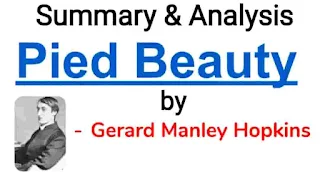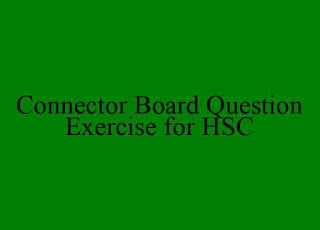Pied Beauty Summary and Analysis by G. M Hopkins
Pied Beauty Summary
The poem is a hymn to creation, praising God by praising the created world. The narrator of the poem says that we should praise God for the skies with two colours, like a two coloured cow; for the little reddish dots on the side of trout; for the way fallen chestnuts look like red coals in a fire; for the blended colours of the wings of a finch; for landscapes divided up by humans into plots for farming; for all the different jobs that humans do.
The poet then describes the qualities of the dappled things. The dappled things are opposite to what is normal; they are original, they are "spare" and don't appear in great numbers; and they are "strange" or unusual. They are fickle, that is, something that changes a lot and freckled, that is, spotted. Some of them are swift, while some other are slow; some of them are sweet, while some others are sour; and some of them are bright, while some others are lustreless or dim. He asserts that God is the father of all beautiful things. God has created all beautiful things. But the beauty of the things created by God is temporary. Though the beauty of the things created by God changes, His own beauty remains changeless. So, he advises the readers to praise God.
Pied Beauty Poem Analysis
The poem is a glorification of God. In the space of about nine línes the poet covers a wide range of things to illustrate the pied beauty of the world which bear the sign of God's glory. The poet mentions
1. Skies of couple-colour
2. The trout with their rose coloured skin spotted with black
3. fallen chestnuts revealing the reddish brown nut.
4. finches wings
5. the landscape which looks like a patch work; and
6. all trades.
In addition to these the poet also mentions the things which are opposite in nature swift and slow; sweet and sour; bright and dim; fickle and freckled. In the last two lines the poet praises God, the father of all this variety and contrasts, whose own beauty is eternal, therefore "past change". So the poem is remarkable for its religious fervour as much as for its vivid and compact imagery.
To quote a critic "Hopkins praises God for brinded cows and the blacksmith's anvils as well as for the so-called poetic objects around him. He whose beauty is past change, is recognized as fathering forth the slow and the sour, the shade as well as the light. Pleasant little echoes ripple and lays through the poem dappled, couple stripple, tackle, fickle freckled, adazzle. ‘Fold’ may be taken two ways of a sheep- fold and its associated meadows, or the folds, in the ground".
Though Nature here lives in dynamic charge it never repeats itself. Like the lark's song it "goes on..through all time, without ever losing its freshness, being a thing both new and old". No two couple coloured skies, trout or finches wings are alike, They are counter to one another, original "spare" in the sense that a spare part stands by itself; and strange in the sense that they cannot be wholly known in turns of past experience.
Though the poet can recognise that it is a cow, a trout, or a sky, to some degree it evades his categories and appears strange, a strangeness which makes him recognise that he does not understand how it is what it is? "who knows how?" He asks, which may mean both: "How can I tell you all the ways in which things can be fickle or freckled? and also: "It is impossible to understand how this comes about."
Commenting on this poem R.K. Thornton says: "Beginning with praise, it builds up through a description of a variety of beautiful things which either are pied or contain opposites of various kinds- colour, taste, speed brightness-to an assertion of the creator of them, whose demanding praise, which ends the poem with a formal perfections by returning to its beginning. The poem differs from The Wreck of the Deutschland, which also deals with paradoxical appear- ances behind which God was the 'ground of being', in that all oppositions here are pleasant, and the effect happily positive".
According to Peter Milward: The conclusion of this sonnet is that all this variety of mortal beauty must proceed from Him whom St. Paul recognizes as the source of all fatherhood in heaven and on earth the immortal source of all that is mortal. Earthly beauty may be fickle; but in its fickleness there is something that charms us by virtue of Him whose ‘beauty is past change’. Earthly beauty may be dappled; but in its fickleness there is something that reminds us of Him who is perfectly simple and without differentiation.
All good attributes of creatures, however, varied among themselves are somehow as G. M Hopkins learnt from Duns Scotus- fully present and united in the rich authenticity of the divine being. These consideration end somewhat abruptly in the practical exhortation “Praise him”. In this brief exhortation, everything in the poem, as in the world of Nature, is drawn to a point, in which all creatures contrib- ute, as well by their varied sounds as by their show of pied beauty, to the grand symphony of praise in honour of their creator".
The first line and the last line of the poem say much the same thing: a pious thanks to God for having provided this wonderful world: "glory be to god for dappled things", and "Praise him". God is past change; all things flow from God and flow black to God. The first line of the sestet ‘Glory be to god for dappled things’ and the last line of the poem place the apotheosis of flux within a framework of stability.
The sonnet begins in exhilaration and ends in solemnity. The two monosyllables (Praise hira) are in a sense, themselves examples of specific creations; they are ‘counter, original, spare, strange’, for they throw the ten line sonnet of balance in a most satisfactory way, even while they are introducing the listeners to a world of changeless values beyond the world of 'fickle' sensible things. And so Hopkins has wonderfully resolved the tension between man's need for infinite variety, for change and his equal need for order, discipline and permanence.
The whole sonnet vibrates with an implicit contrast between “swift, slow”; creatures are moving at different rates of speed, and the patient ploughman moves at even slower rate than fish and finches. And so in the sky, under the water, and on the rich earth; the whole universe is swaying in shifting patterns of move- ment to the dictates of some unseen orchestra. And for Hopkins, behind the orchestra was a silent God, who caused all flux and all majesty of motion and all binding to principles beyond flux and motion.




